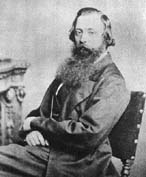

27 August 1829 – 7 september 1901
He was born in Büdingen at 445 km from Giessen. He met the great chemist Julius Liebig in 1847 and enters the same year the university of Giessen as a medical student. Despite a thesis on an anatomical subject, he worked in Liebig’s laboratory where he developed a keen interest in biological chemistry. Owing to political difficulties (war between Prussia and Denmark), he decided to emigrate to London in 1853 and lived there until his death in 1901.
– In 1856 he was appointed physician at St Pancras Dispensary and then, practiced medicine throughout his life as an otologist and rhinologist (he invented a special nasal speculum).
– In 1858 he was appointed lecturer in chemistry at the Grosvenor Place School of Medicine and later was director of a pathological and chemical laboratory. The same year, he published his first book on the analysis of urine which represents for that time the greatest chemical elaboration helping physicians to understand and diagnose many diseases.
– In 1863 he published a book concerning the chemistry of gall stones. He isolated and classified bile pigments from these objects.
– In 1866 he was appointed chemist to the medical department of the Privy Council. It seems that he began to investigate the effects of cholera on the brain. These first investigations were the background of his major original work on the chemical constituents of the brain. From 1871 he accomplished his research at home in his private laboratory.
– In 1884 appeared the first English edition of his famous “Treatise on the chemical constitution of the brain (Baillière, Tindall and Cox, London)”. A German translation appeared in 1901 in Tübingen.
During his continuous researches on ox brain, he showed that “Protagon”, described by Leibrich as a unique substance forming the brain, was a mixture of lecithins, cephalins and myelins as phosphatides.
He identified sphingomyelin, the sulfatides and cerebrosides in the brain. He named these new substances from Greek and studied their distribution in the grey and white matter. He was very proud of his work and thus wrote that “they are of fundamental importance and all further developments in chemical neurology must start from them as a basis” and “When the normal composition of brain shall be known to the uttermost item, then pathology can begin its search for abnormal compounds or derangements of quantities“.
Thudichum was a controversial figure and he was largely suspected and criticized. His fame is entirely posthumous. Indeed, he was some years later considered as the first English biochemist (Otto Rosenheim).
DISPERSIVE LIQUID-LIQUID MICROEXTRACTION
Lire la suiteDevenez membre et participez au développement de la Lipidomique au XXIème siècle.
S'inscrire